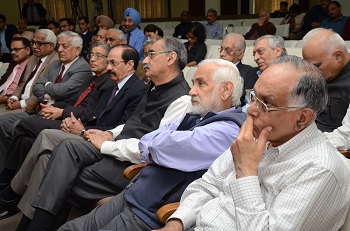Amidst growing uncertainties about Afghanistan’s future, the VIF hosted the Chief Executive Officer of the national unity government in Afghanistan His Excellency Dr. Abdullah Abdullah to deliberate upon a wide spectrum of issues, including, among others, the post drawdown scenarios in Afghanistan, the ongoing efforts towards peace and reconciliation among various warring factions, the need for capacity-building by Afghanistan’s national army, the Taliban’s potential resurrection, the role of regional actors in Afghanistan, and India’s continued relevance in Afghanistan. Ambassadors of the two respective countries, Shaida Mohammad Abdali and Amar Sinha were among the strategic experts who participated in the interaction.
 In his opening remarks, General Vij, Director VIF, raised a bevy of questions, bearing relevance to Afghanistan, but also strategically relevant to India. Putting a question mark over the fragile peace process which is presently underway in Afghanistan, the Director asked how durable the peace process would be, especially in light of the fact that different stakeholders have divergent views and often conflicting interests. The recent months have witnessed a spike in violence in Afghanistan where the armed forces, fighting a resurgent Taliban, have to take substantially high rates of attrition. The Director questioned the capabilities of the Afghanistan National Army (ANA) to absorb the high rates of attrition over a longer duration. He further underlined the need to restructure the ANA and equip it with the necessary wherewithal. Among other notable issues brought before H.E. Dr. Abdullah, the Director urged the need for a better understanding of China’s role in the emergent situation in Afghanistan and the latter’s growing bonhomie with Pakistan. While questioning Pakistan’s continued thrust for a strategic depth in Afghanistan, the Director also stressed the need for Afghanistan to draw redlines both for Pakistan and Taliban. A former Chief of the Indian Army, General Vij, forewarned Afghanistan about the danger inherent in any potential reinstatement of the Taliban in the ANA. The opening remarks by the Director also raised the most significant question from India’s perspective, where does all of this leave India which has invested so much in Afghanistan?
In his opening remarks, General Vij, Director VIF, raised a bevy of questions, bearing relevance to Afghanistan, but also strategically relevant to India. Putting a question mark over the fragile peace process which is presently underway in Afghanistan, the Director asked how durable the peace process would be, especially in light of the fact that different stakeholders have divergent views and often conflicting interests. The recent months have witnessed a spike in violence in Afghanistan where the armed forces, fighting a resurgent Taliban, have to take substantially high rates of attrition. The Director questioned the capabilities of the Afghanistan National Army (ANA) to absorb the high rates of attrition over a longer duration. He further underlined the need to restructure the ANA and equip it with the necessary wherewithal. Among other notable issues brought before H.E. Dr. Abdullah, the Director urged the need for a better understanding of China’s role in the emergent situation in Afghanistan and the latter’s growing bonhomie with Pakistan. While questioning Pakistan’s continued thrust for a strategic depth in Afghanistan, the Director also stressed the need for Afghanistan to draw redlines both for Pakistan and Taliban. A former Chief of the Indian Army, General Vij, forewarned Afghanistan about the danger inherent in any potential reinstatement of the Taliban in the ANA. The opening remarks by the Director also raised the most significant question from India’s perspective, where does all of this leave India which has invested so much in Afghanistan?
Dr. Abdullah Abdullah, a seasoned diplomat and a military professional of high eminence, replied forthrightly and with utmost candidness to all the questions raised by the Director in his opening remarks. He not only elaborated upon the situation that led to formation of the Unity Government but also shed significant light on the political road ahead, especially dwelling upon the prevailing politico-security situations in Afghanistan.  A large part of Dr. Abdullah’s speech was devoted towards allaying India’s apprehensions that investments made by her in Afghanistan will not go waste. India has not only supported Afghanistan economically but also helped it nurture democratic roots. The Chief Executive further said Indian activities in Afghanistan are perfectly aligned with Afghanistan’s national interests.
A large part of Dr. Abdullah’s speech was devoted towards allaying India’s apprehensions that investments made by her in Afghanistan will not go waste. India has not only supported Afghanistan economically but also helped it nurture democratic roots. The Chief Executive further said Indian activities in Afghanistan are perfectly aligned with Afghanistan’s national interests.
Admitting Afghanistan has serious issues with Pakistan, Dr. Abdullah said both countries need to sort out their differences. Pakistan however will be tested against its actions and not words, he said. In so far the capacities of the ANA to deal with insurgent threats are concerned, Dr. Abdullah admitted there are some weaknesses, but he also reposed faith in his troops who are courageously taking on Taliban in areas where it was difficult for the foreign troops to operate earlier. Nevertheless, Afghanistan needs international assistance in so far as beefing up its security apparatus is concerned. On the political front, Afghanistan needs stability which again is the key to resolving the security challenges. Political maturation however will take time, Dr, Abdullah added. He further assured the house that Afghanistan will not turn into an Islamic Emirate that it once was, and that hardcore Islamist forces will be kept at bay. Afghanistan’s tryst with the Taliban, China’s thrust into Afghanistan, and Afghanistan’s bilateral security agreement with the US were among host of other subjects comprehensively discussed during the interactive session. The audience also chipped in with lots of insightful questions.








